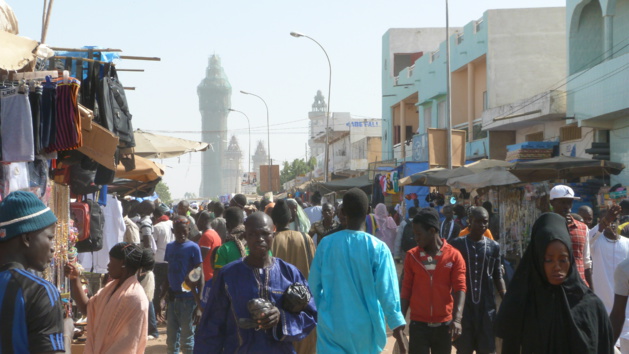
Credit Thomas Delattre
“Touba! Touba! Touba!” Amongst the noise of car engines and horns, the ticket inspectors’ calls can hardly be heard over the surrounding commotion. Gathered in swarms, the buses wait for the pilgrims before they begin their long journey towards Senegal’s Holy City. The gas station’s bright light contrasts sharply with the night. In the packed buses, the disciples wait quietly, in a dozing peace. It is 4 a.m. Outside, taxi drivers rail against the hesitant people, and street vendors offer peanuts and coffee. All the vehicles finally get going, and a poorly arranged line starts moving towards Touba.
In his twenties, with broad shoulders, Pape is going on the pilgrimage as well. The young man left on the eve of Saint-Louis and has been on the road for about ten hours, but his enthusiasm is not waning. “I am going to meet my family”, he says lively. “They are all there.”
When he arrives in Touba, Pape rushes out of the bus. “Here we are!” he exclaims with a large smile. As soon as he reaches the bus station, the pilgrim is overwhelmed with the calls to prayer that can be heard from the speakers. In the city’s streets, passer-bys elbow their way through, covering their faces with a cloth to avoid the torrents of dust. Pape walks nimbly through the heavy traffic of taxis, buses and carts. He finally stops at the entrance of a house with worn paint, where about thirty of his family members are busying themselves about. A group of women are cooking tonight’s meal as children come and go. Sitting down on a mat, a group of men talk about the festivities. “The real celebration is at night”, Pape explains, a glimmer of excitement in his eyes.
Between devotion and meditation
Like every year, on the 18th Safar from the Hijri calendar (11th December in 2014), hundreds of thousands of Mourides converge towards Touba for the Grand Magal, Senegal’s main religious event. Mouridism is a branch of Islam that developed around one man, Cheikh Ahmadou Bamba. It combines Prophet Muhammad’s lessons with values from the Wolof culture and is practiced today by 28% of the Senegalese population.
Born in 1853, Ahmadou Bamba preached Islam in a Senegalese society disrupted by colonisation. Despite a supposedly peaceful doctrine, he was exiled to Gabon in 1895 by the French, who considered him a threat to their domination. He only came back to Dakar in 1902 to the crowd’s acclamations, as he was believed to be dead, before being exiled again to Mauritania for four years. Today, an extensive mythology has developed around the holy man’s actions and miracles. According to the legend, thirteen colonial soldiers collapsed and dropped dead as Bamba was about to be executed. He founded Touba, where he was buried and where believers commemorate his departure into exile during the Magal.
The disciples wait for hours, squashed together, in order to come closer to Bamba and his descendants’ mausoleum, the high point of the pilgrimage.
In the large mosque, the most fervent ones have been reading the Koran for hours. The Magal also allows Mourides to meet their spiritual leaders who give them advice and instructions for the year to come. Thus, this year, the Caliph General enjoins the Senegalese people to get to work, because “a country would not be able to develop through society life”. Those, like Pape, who have a pied-a-terre, will continue to celebrate Bamba and the family reunion until late into the night.
In the large mosque, the most fervent ones have been reading the Koran for hours. The Magal also allows Mourides to meet their spiritual leaders who give them advice and instructions for the year to come. Thus, this year, the Caliph General enjoins the Senegalese people to get to work, because “a country would not be able to develop through society life”. Those, like Pape, who have a pied-a-terre, will continue to celebrate Bamba and the family reunion until late into the night.
A social and political importance
“All the religious families in Senegal and the region participate in the Magal, it is far more than a religious event.” says Serigne Bassirou Abdou Khadre, the Caliph General’s spokesperson, a religious Mouride authority. “Mouridism is a source of stability and national harmony”, he continues. According to the organisers, no less than four million pilgrims might have gone to Touba this year. The Senegalese state was highly involved in the event. 1,300 policemen and 160 men from the health service are deployed, and the army gives out bread rolls and coffee, in order to ensure the serenity of the moment. To make sure the plates are full, 3,500 tons of rice are distributed, including 2,000 tons that are reserved to the poor.
The Magal is also an opportunity for politicians to make an appearance. Abdoulaye Wade, the country’s first Mouride President from 2000 to 2012 went to Touba on the weekend previous to the celebrations. In recovery since his electoral defeat against Macky Sall, he was given a very warm welcome. A symbol of the patronage that eats away at Senegalese politics according to Moustapha Cisse Lo, a faithful deputy to Macky Sall. He claims that the former President might have given out money to the believers: “He praises people and pretends he mobilised them. He uses the money he stole, which is billions”. The religious enthusiasm will not have erased political divergence.
At the time of departure, buses and taxis start again their morning dance, as everyone tries to find a means of transportation. It is with the feeling of accomplishment that they go in and take advantage of the ride to discuss politics, between the current President’s supporters and opponents. On the walls along the road, all graffiti show “Bamba merci” (“Thank you Bamba”), as a last show of the enthusiasm for the Magal.




























